Rat and mouse control in Vancouver, BC
Effective and Reliable Rodent Control
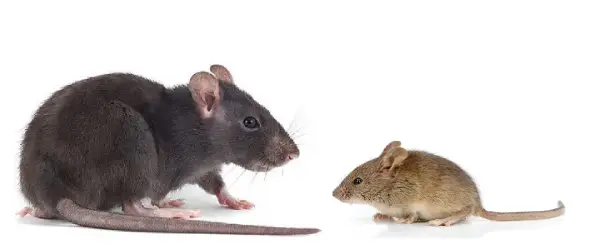
Our team of certified technicians use proven and effective techniques and remedies to ensure we supress rodents quickly and efficiently from your home or business. We highly recommend an initial inspection to understand activity levels, detect entry points, and formulate an immediate action plan that follows IPM (Integrated Pest Management).
Our personalized services focus on quick response times and long-term solutions. Don’t wait for the problem to escalate—schedule your rodent control service with 1st Pest Control today. Protect your property and peace of mind with our effective rodent control solutions.
How do rodents get into my house?
Rats are incredibly resourceful when it comes to finding ways into your home. Here are some common entry points and reasons they might be attracted to your living space:
- Gaps and Cracks: Rats can squeeze through tiny gaps and cracks in your home’s foundation, walls, and roof. Even a hole as small as a quarter can be an entry point.
- Doors and Windows: Openings around doors and windows, especially if they are not properly sealed, provide easy access for rats.
- Pipes and Utility Lines: Rats often enter homes through gaps around pipes and utility lines that lead into the house.
- Food and Shelter: Rats are attracted to homes that offer easy access to food and shelter. This includes pet food, bird seed, compost, and cluttered areas where they can nest.
How exclusion work prevents rats and mice from accessing your home?
Exclusion work is a crucial step in mouse control that involves detecting and sealing all entry points and exclusion areas to prevent mice from entering your home, such as loose or missing shingles, gaps around chimneys and vents, cracks in the fascia board or soffit, cracks in the foundation or walls, gaps around pipes, electrical outlets or switches.
Exclusion methods
We employ a diverse array of exclusion materials to address rodent issues, including wire mesh, metal flashing, one-way entrances, and trenching techniques. Please see some of the devices we employ to deter rodents.
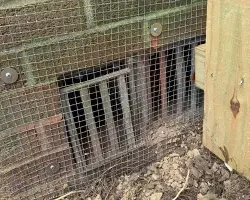
Wire meshing
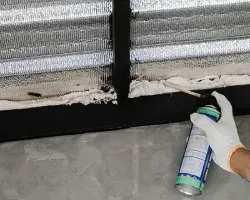
Expansion Foam
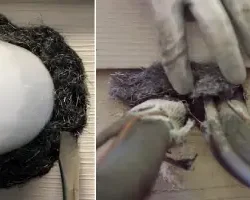
Fill fabric

New to 1st Pest Control?
Enjoy 10% OFF your first treatment service.
Enter Code NEW10 in the contact form

Ready to Rid Your Home of Pests? Contact 1st Pest Control Now for Expert Treatments.
Request a free, no-obligation estimate today
Rats and mice FAQs
What's the difference between Norway and roof rats?
Differentiating between Norway rats (Rattus norvegicus) and roof rats (Rattus rattus) can be done by examining several physical and behavioural characteristics:
- Size and Body Shape:
- Norway rats are typically larger and heavier, with a more robust body compared to roof rats.
- Roof rats are sleeker and smaller in comparison, with a more slender body.
- Head Shape:
- Norway rats have a blunt, rounded snout.
- Roof rats have a more pointed, triangular-shaped snout.
- Ears:
- Norway rats have smaller ears relative to their body size.
- Roof rats have large ears that are prominent and extend beyond the fur.
- Tail Length:
- Norway rats have shorter tails, usually shorter than their body length.
- Roof rats have long, thin tails that are longer than their body length.
- Fur Colour:
- Norway rats typically have brown or grey fur on their backs and a lighter underside.
- Roof rats may have darker fur on their back and a lighter underside, but their fur colour can vary widely.
- Habitat:
- Norway rats are ground-dwelling rodents that tend to burrow and live in underground tunnels, sewers, and basements.
- Roof rats are agile climbers and are often found nesting in higher areas such as trees, attics, rafters, and the upper floors of buildings.
Observing these characteristics, along with the location and behaviour of the rodent, can help in determining whether it is a Norway rat or a roof rat.
| Roof rat | Norway Rat |
|---|---|
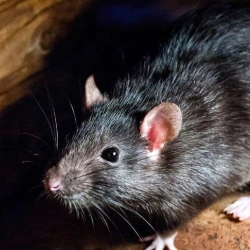 |
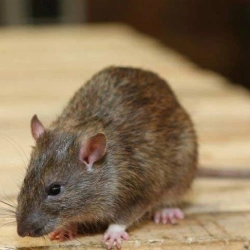 |
Can rats or mice make me or my family sick?
Yes. Proper rodent control is needed to protect yourself, as they are a well-known carrier of diseases which may be easily transmitted to humans. Diseases they are associated with include, but are not limited to, hantavirus pulmonary syndrome, lestospirosis and rat-bite fever. These diseases are transmitted through direct contact, or the inhalation or consumption of contaminated items. Infected ticks carried by these rodents may also spread diseases to humans with devastating effects.
For example, rats carrying infected ticks caused the spread of the bubonic plague, otherwise known as the Black Death, in Europe that killed half the population during the Middle Ages. Other than physical illness, infestations have been known to affect the emotional and psychological well-being of the homeowner or tenant.
Where will I generally find rats and mice in my home or business?
Rats and mice are primarily nocturnal creatures by nature. They tend to nest or sleep in dark and quiet corners and crevices of a building’s structure, such as in the roofs, basements, attics and walls. Storage units or cluttered areas are also ideal hiding places for these rodents.
Where do rats and mice come from?
Rats and mice are generally very small and can easily enter a residence through small, obscure openings. In fact, mice can enter a home through an opening the size of dime, where rats only require an opening as small as a quarter.
Point of entry may include entrances, windows, and through the cracks and crevices along walls and floors. Rats and mice are attracted to warm places with easy access to food and water and they feed on a variety of organic material, including both plant and protein-based products.
As a result, an occupied residence is an ideal place for them to survive and breed rapidly
How to safeguard your property from mice and rats?
Answer:
Seal entry points: Check for cracks, gaps, and holes around your house, especially near windows, doors, and utility pipes. Seal them with caulk, steel wool, or other suitable materials. This will prevent rodents from entering your home.
Keep indoor areas clean: Rodents are attracted to food sources and shelter. Maintain a clean kitchen and avoid leaving food uncovered or accessible. Regularly clean up spills, crumbs, and garbage.
Store food properly: Keep all food, including pet food, in sealed containers made of metal or glass. Rodents can easily chew through plastic containers.
Dispose of garbage properly: Use sealed garbage bins and regularly dispose of trash. Keep outdoor garbage away from the house and ensure that bins have tight-fitting lids.
Secure possible nesting areas: Remove clutter and potential hiding spots in basements, attics, and storage areas. Seal openings and gaps to prevent rodents from nesting.
Trim trees and shrubs: Keep trees and shrubs trimmed away from your house to prevent rodents from using branches as access points to your home.
Maintain a tidy yard: Keep the yard well-maintained and free from debris, such as woodpiles or old furniture, where rodents can hide or nest.
Install screens and caps: Use wire mesh screens on vents, chimneys, and other openings that could serve as entry points for rodents. Ensure all openings are covered with tight-fitting caps or screens.
Keep the garage organized: Rodents often find their way into the garage. Store items in plastic bins instead of cardboard boxes, as rodents can easily chew through them. Avoid leaving the garage door open for extended periods.
Inspect periodically: Regularly inspect your house and surroundings, especially during the winter months when rodents seek shelter. Look for signs of droppings, gnaw marks, or any other indications of rodent activity.
Seek professional help: If the rodent problem persists or becomes unmanageable, consider contacting a professional pest control company such as 1st Pest Control for assistance. They can evaluate the situation and provide effective solutions.
What damage can they cause to my property?
Rats and mice are notorious for causing damage in homes or businesses. Tooth marks from gnawing or chewing can be found on various surfaces and items they come in contact with. The primary reason for damage is because a rodent’s front teeth does not stop growing.
As a result, it must continuously gnaw on objects to keep its teeth filed down. Without rodent control, these pests will continue to feed and nest, causing damage to your property.
Their jaws are very strong and can chew through walls, soft concrete, wiring and pipes. These activities may lead to structural damage and create electrical and fire hazards. Droppings and urine left behind contaminate surfaces and food exposed to these rodents are no longer safe for human consumption and must be thrown away.
Why do I have to get rid of them?
- Rats and mice cause damage to the content or structure of a property that may be very costly to fix or replace. In addition, they are carriers of diseases that can be transmitted to humans simply by being in direct or indirect contact with the rodents or their wastes.
- Rats and mice breed rapidly and with a greater population comes increase risk to the health and safety of occupants.
- Mice can damage wires, books, plastics, aluminum cans, drywall, insulation, siding, and wallboards
Is there a link between rodents and the bubonic plague?
The bubonic plague, also known as the Black Death, is a highly contagious and deadly disease that ravaged Europe in the 14th century, resulting in the deaths of millions of people. One of the key links between rodents and the bubonic plague is the role that rats and fleas played in spreading the disease. Rats were the primary carriers of the bacteria that caused the plague, while fleas served as the vectors that transmitted the disease from rats to humans.
Rats were able to spread the bubonic plague to humans through their fleas, which would bite infected rats and then bite humans, transferring the bacteria in the process. The unsanitary living conditions of medieval cities, combined with the large numbers of rats present, created the perfect breeding ground for the bacteria to spread rapidly among both rats and humans. As a result, the bubonic plague was able to decimate entire populations in a matter of months, leading to widespread death and destruction.
The link between rodents and the bubonic plague is not limited to historical instances, as outbreaks of the disease continue to occur in various parts of the world today. In regions where sanitation is poor and rat populations are high, there is a heightened risk of the bubonic plague resurfacing. Efforts to control rat populations and improve sanitation practices are crucial in preventing the spread of the disease and protecting public health.
In conclusion, the link between rodents and the bubonic plague is clear and significant, as rats and fleas played a crucial role in spreading the disease throughout history. Understanding this link and taking proactive measures to control rat populations and improve sanitation practices are essential in preventing future outbreaks of the bubonic plague. By addressing the root causes of the disease, we can help to ensure the health and well-being of populations around the world.
What are the benefits when comparing the three and 12-month rodent control programs?
- Comprehensive and sustained protection: The 12-month program offers extended protection against rodent re-infestation, ensuring that the house remains rodent-free for a longer period compared to the shorter 3-month program.
- Continuous monitoring and prevention: With the 12-month program, homeowners receive ongoing monitoring and preventive measures to detect and address any potential rodent issues before they become a full-blown infestation.
- Greater peace of mind: Knowing that their home is protected and monitored for a longer duration can provide homeowners with increased peace of mind, eliminating worries about rodent problems.
- Cost efficiency: The 12-month program proves to be a more cost-effective option as it provides sustained rodent control at a lower cost per month compared to the shorter program.
- Time savings: By opting for the 12-month program, homeowners can save time and effort in dealing with multiple instances of rodent infestation and can focus on other aspects of home maintenance and well-being.
These benefits make the 12-month program a highly advantageous choice for homeowners, ensuring long-lasting, efficient, and cost-effective rodent control.


